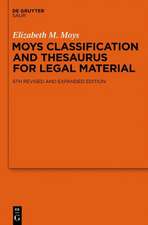Knowledge Management: Historical and Cross-Disciplinary Themes: Libraries Unlimited Knowledge Management Series
Autor Danny P. Wallaceen Limba Engleză Hardback – 29 dec 2007 – vârsta până la 17 ani
Preț: 392.40 lei
Preț vechi: 508.87 lei
-23% Nou
Puncte Express: 589
Preț estimativ în valută:
75.11€ • 81.61$ • 63.13£
75.11€ • 81.61$ • 63.13£
Carte tipărită la comandă
Livrare economică 21 aprilie-05 mai
Preluare comenzi: 021 569.72.76
Specificații
ISBN-13: 9781591585022
ISBN-10: 1591585023
Pagini: 244
Dimensiuni: 178 x 254 x 18 mm
Greutate: 0.68 kg
Ediția:Second.
Editura: Bloomsbury Publishing
Colecția Libraries Unlimited
Seria Libraries Unlimited Knowledge Management Series
Locul publicării:New York, United States
ISBN-10: 1591585023
Pagini: 244
Dimensiuni: 178 x 254 x 18 mm
Greutate: 0.68 kg
Ediția:Second.
Editura: Bloomsbury Publishing
Colecția Libraries Unlimited
Seria Libraries Unlimited Knowledge Management Series
Locul publicării:New York, United States
Notă biografică
Danny P. Wallace was professor, School of Library and Information Studies, University of Oklahoma, Norman. He was coeditor of RUSA Quarterly, coauthor of Library Evaluation (Libraries Unlimited, 1999), and served on ALA's accreditation committee.
Cuprins
Chapter 1: The Nature Of KnowledgeChapter 2: Communities Of PracticeChapter 3: Organizational Learning And Learning OrganizationsChapter 4: Intellectual CaptialChapter 5: Knowledge SharingChapter 6: Knowledge RepresenatiionChapter 7: Content ManagementChapter 8: Taxonomies And OntologiesChapter 9: Informatics And Information TechnologyChapter 10: The Future Of Knowledge Management
Recenzii
The strength of this book lies in the author's ability to pull together diverse philosophies and multiple theories as they relate to this new field called knowledge management. Wallace includes a fair representation of philosophies and highlights the contributions of each, using a writing style that is as simplified as advanced academic-level material permits. Collapsed biographies of philosophers are presented throughout the chapters, permitting readers insight into events that may have influenced their lives and thinking..This work recommends itself to library and information science faculty, students, and practitioners, and is considered required reading for courses in knowledge management. It is also useful for people in the computer sciences and human-computer interaction fields. Recommended. Upper-division undergraduates through professionals.
Wallace makes an important contribution to the knowledge management (KM) literature by explicating KM within a rich historical and multidisciplinary context. Organized by thematic chapters ranging from epistemology to systems thinking and learning organizations to taxonomies to KM itself, the book relies on key papers for each. While some papers, like Adrianna Kezars work on organizational learning, are omitted, overall Wallace is thorough. Wallaces carefully detailed discussions and numerous references to the primary KM literature in many disciplines make the book well suited for a library science and/or KM textbook..Highly recommended for library science, organizational development, knowledge management, and related academic library collections.
Beginning with a discussion on the history of the use of the term knowledge management, the author proceeds in great detail to examine the literature of epistemology, especially as it relates to organizing and disseminating knowledge for use. Each chapter begins with key term definitions and is divided into easily digestible chunks. This is for those interested in the theory of knowledge and knowledge management.
This collection of easy-to-understand essays on previously published complex works from 1928 through 1999 is presented by a professor in the School of Library and Information Studies at the University of Oklahoma, making the field approachable for novices. This work is intended for all students of knowledge management and closely related fields as well as knowledge management practitioners who want to place the field in context. . . . An extremely useful addition to any collection serving a population that studies or uses knowledge management, this work brings the often dry and hard-to-understand original writings to life with commentary and interpretation by an instructor of the field.
Wallace makes an important contribution to the knowledge management (KM) literature by explicating KM within a rich historical and multidisciplinary context. Organized by thematic chapters ranging from epistemology to systems thinking and learning organizations to taxonomies to KM itself, the book relies on key papers for each. While some papers, like Adrianna Kezars work on organizational learning, are omitted, overall Wallace is thorough. Wallaces carefully detailed discussions and numerous references to the primary KM literature in many disciplines make the book well suited for a library science and/or KM textbook..Highly recommended for library science, organizational development, knowledge management, and related academic library collections.
Beginning with a discussion on the history of the use of the term knowledge management, the author proceeds in great detail to examine the literature of epistemology, especially as it relates to organizing and disseminating knowledge for use. Each chapter begins with key term definitions and is divided into easily digestible chunks. This is for those interested in the theory of knowledge and knowledge management.
This collection of easy-to-understand essays on previously published complex works from 1928 through 1999 is presented by a professor in the School of Library and Information Studies at the University of Oklahoma, making the field approachable for novices. This work is intended for all students of knowledge management and closely related fields as well as knowledge management practitioners who want to place the field in context. . . . An extremely useful addition to any collection serving a population that studies or uses knowledge management, this work brings the often dry and hard-to-understand original writings to life with commentary and interpretation by an instructor of the field.




